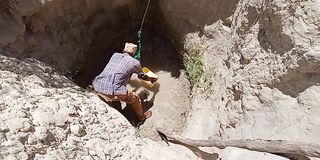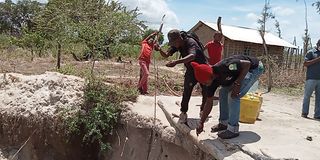Premium
Thousands of families in dire need of water in Lamu

Hussein Abdalla,aresident of Hindi-Magogoni village inside a well as he fetches water. At least 22,600 families in Lamu are facing acute water shortage.
At least 22,600 families in Lamu county are facing an acute shortage of water as drought continues to ravage the region.
A recent report released by the County Steering Group (CSG) on food security, which was spearheaded by the National Drought Management Authority (NDMA) indicates that at least Sh124 million is urgently needed to undertake water trucking and other water-related interventions in various parts of Lamu County.
Apart from the areas worst hit by the drought spell, residents in other parts of Lamu, including Lamu Town, Mokowe, Matondoni, and Shella have also been forced to adhere to frequent water rationing.
Lamu Water and Sewerage Company (Lawasco) managing director, Kimani Wainaina told nation.africa that frequent water shortages are occasioned by a reduced water supply from the Shella Sand dunes, the main water reservoir in the region, especially since the drought season kicked in.
“There is no consistent water supply in people’s houses in recent weeks, but it is not our fault. The prolonged drought season has caused reduced water levels in the main wells at Shella Sand dunes. Water production is very low with some wells even having stopped to produce altogether. Things will normalize once the drought spell is over,” said Mr Wainaina.
Other places where water shortage continues to bite include Shanga Rubu, Bahamisi, Mtangawanda, Lumshi, Tewe, Roka, Bobo, Manyatta, Kibokoni, Pandanguo, Kiangwe, Moa, Chalaluma, Basuba, Milimani, Magogoni, Bar’goni, and surrounding areas.
The situation in these areas has forced locals to resort to desperate measures, including consuming dirty water from open wells and rivers as they try to salvage themselves from the adverse drought effects.

Photos of residents of Hindi-Magogoni villagers fetching water from an open well as drought ravages Lamu county.
This has resulted in the outbreak of waterborne diseases, including diarrhea, bilharzia, and skin diseases.
nation.africa established that by Sunday, more than 200 children in terror-prone Boni forest villages-Kiangwe, Milimani, and Basuba were suffering from diarrhea, bilharzia, and skin ailments believed to be contributed using occasioned by the use of dirty water.
Residents in Boni forest rely mostly on water from rivers, open wells, and boreholes but since the dry season commenced, most of their natural water sources have dried up with the few remaining ones having to share together with wildlife.
Apart from diarrhea, bilharzia, and skin diseases, the dirty water has also left many of its dependents with discolored and corroded teeth due to its high acidity levels.
Fatma Delo, a resident of Kiangwe said they sometimes must go for days without cooking since there is no fresh water to cook with.
The residents are now calling on both the county and national governments to intervene and urgently distribute freshwater to their villages using water bowsers.
“We queue for several days just to get a container of water from the well and even then, that water has so much acidity that many of us have our teeth corroded. We have to rise up as early as 2 am to queue for the water and even then, you will find many other people already there,” said Ms Delo.
She added, “The well normally runs dry due to too much dependence and in such a case, we have to wait for some more days for it to refill. People have been fighting and injuring each other over this well here. The government should distribute freshwater here as our children are also suffering from waterborne diseases.”
A similar situation has been reported at Hindi-Magogoni and Kwasasi villages where over 200 families have also been forced to line up and fetch water from a single open well which is both dirty and unhealthy.
Many times, women must breach the curfew orders and camp at the well overnight just to fetch a jerrycan of water for their families.
“Our children here are also prone to bilharzia as they drink dirty water because we have no other option,” said Ms Alice Mawiya, a resident.
Villagers of Dide Waride, Chalaluma, Moa, and Pangani in Witu, the majority of whom are herders have also been forced to share water sources with their livestock resulting in a myriad of waterborne infections.
In Pandanguo village, school attendance has greatly been affected as most children join their parents in the long treks in search of food and water from far-flung villages kilometers away.
“Our children don’t attend classes. They accompany us in search of water and food in far places. The nearest place where we buy water is Witu town which is more than 21 kilometres from here. We need help,” said Pandanguo village elder Adan Golja.





